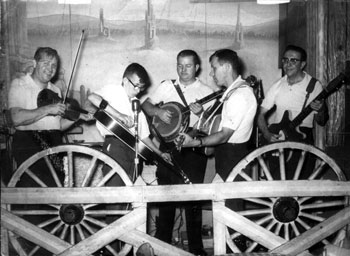
From left: Everett
Lilly, Roger, Don Stover, Bea Lilly, Ross Whittier;
circa 1964 at the Hillbilly Ranch in Boston, MA
Roger
Williams was born to traveling musicians Gerry
Lee and Curley
Williams, who were on the road performing with
Ray
Bradley and His Tennessee Champions (Gerry
on upright bass and vocals, and Curley on Dobro and vocals). At
that time, they were working in northeastern Maine in the town of
Presque Isle. By the time Roger was a month old, Gerry realized
that being on the road constantly wouldn't allow her the time to
be the mom she wanted to be. So she returned to her hometown of
Lawrence, Massachusetts where Roger spent his formative years. Although
she no longer toured, music continued to be a vital part of her
life and those of other family members, and she passed her passion
on to Roger. From an early age he learned to sing the harmany parts
to Gerry's vast repertoire of old country songs.
In his early teens Roger developed an interest playing the Dobro after
having seen one being played on a weekly television show featuring
local country and bluegrass acts. Roger's father Curley--who ultimately
would be honored by the Massachusetts Country Music Hall of Fame--gave
Roger some pointers to get him started. Roger, newly obsessed with
this strange new instrument, took it from there. Within a year Roger
was sitting in with The
Lilly Brothers and Don Stover at the world famous
Hillbilly Ranch in Boston, Mass. where they
had performed for nearly two decades. Since then he has gone on to
perform and/or record with many well respected bluegrass and folk
acts on the national and international circuit, including Don
Stover & The White Oak Mountain Boys,White Mountain Bluegrass,
Hazel Dickens, Joe Val, Bill Harrell, Bill Clifton, Delia Bell &
Bill Grant, Southern Rail, Ray Legere
(with Mark
Schatz and Wyatt
Rice),
Mac Wiseman,The
New England Bluegrass Band, Salamander Crossing, Slavek Hanzlik, Mark
Erelli, Hiro Arita,
among others. Career highlights include
thirteen overseas tours with various artists and teaching workshops
during Bluegrass Week at the Augusta Heritage Center in Elkins, WV,
as well as at Resosummit in Nashville, TN. Roger currently performs
with Amy
Gallatin & Stillwaters, which has a steady
presence in Europe, UK, and Canada, as well as the eastern seaboard
of the U.S.
The accolades
he has received over the years are a testament to his musicianship,
perhaps best summed up by songwriter and frequent collaborator Randy
Spencer: "When I sit in the control
room and hear tracks that Roger is trying out on dobro, I know I'm
in the presence of greatness. Characteristic of a short list of musicians,
Roger doesn't merely play along or complement a song, Roger interprets.
I don't even start a CD until I call Roger."
In addition
to his Nashville duet album with Amy
Gallatin ("Something 'Bout You") and
his work as producer, arranger, engineer, and musician on Stillwaters'
"Everything
I Wanted Love To Be" and
"Phoenix",
Roger also has four solo projects: "A
Resophonic Retrospective" (a compilation disc
from his first two instrumental projects of "Fireball"
and "Route
2 To Amherst"),
" River Of No Return",
a collaboration with long time musical associate Ray
Legere, a duet album of all original material
with his son, JD
Williams entitled "Williams
Squared", and most recently "I
Know This Road''.. He has been involved in numerous
of the CMH label's Pickin'
On series, where different musical genres are
interpreted in the bluegrass vein.
For more info
on Roger's recordings, please visit the 'Albums'
page.

















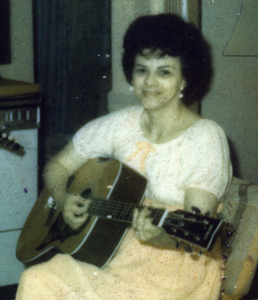
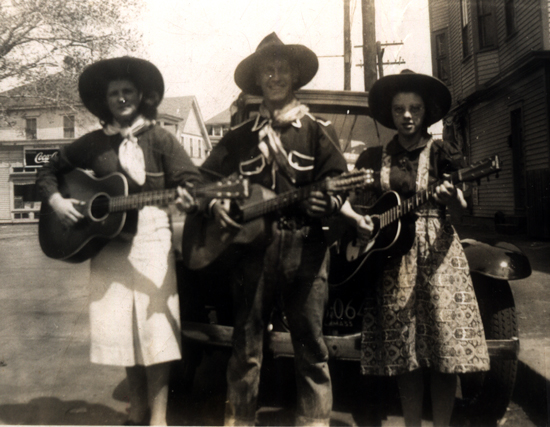
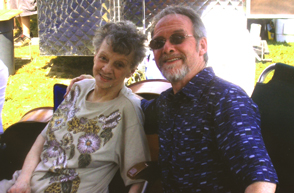
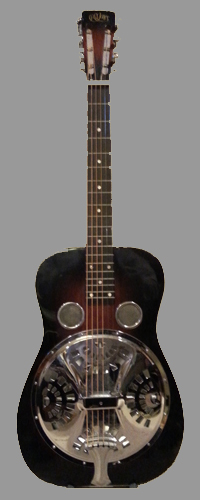 One
spring In the mid-1980's. Roger was about to embark on his first overseas
tour with a bluegrass band. In the years that followed he would do
seven more, but this time the schedule would take his group through
much of continental Europe. He checked his instrument at the Logan
Airport baggage desk and boarded a British Airways jet bound for London's
Heathrow Airport. With little sleep and a gig that very night in the
Netherlands, Roger went to baggage claim somewhat bleary-eyed and
ill-prepared for the bleak news: his dobro had not come in on the
plane! There was nothing to be done about it on the spot; the group
had to leave and fast, and Roger was forced to borrow a lesser dobro
for the upcoming performances. It bore little resemblance to his R.
Q. Jones handmade masterpiece, at the time the finest available. But
Roger's instrument was special beyond its name. From one of his many
... national dobro competitions, he had won a sound chamber cover
plate, engraved with the date, 1977, the only one made that year.
His instrument also had a tortoise shell bridge, a unique feature
that Roger found produced better sound. But now, all was lost and
what followed for Roger Williams was a very dark period of his professional
life.
One
spring In the mid-1980's. Roger was about to embark on his first overseas
tour with a bluegrass band. In the years that followed he would do
seven more, but this time the schedule would take his group through
much of continental Europe. He checked his instrument at the Logan
Airport baggage desk and boarded a British Airways jet bound for London's
Heathrow Airport. With little sleep and a gig that very night in the
Netherlands, Roger went to baggage claim somewhat bleary-eyed and
ill-prepared for the bleak news: his dobro had not come in on the
plane! There was nothing to be done about it on the spot; the group
had to leave and fast, and Roger was forced to borrow a lesser dobro
for the upcoming performances. It bore little resemblance to his R.
Q. Jones handmade masterpiece, at the time the finest available. But
Roger's instrument was special beyond its name. From one of his many
... national dobro competitions, he had won a sound chamber cover
plate, engraved with the date, 1977, the only one made that year.
His instrument also had a tortoise shell bridge, a unique feature
that Roger found produced better sound. But now, all was lost and
what followed for Roger Williams was a very dark period of his professional
life.